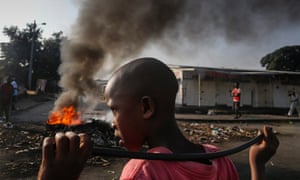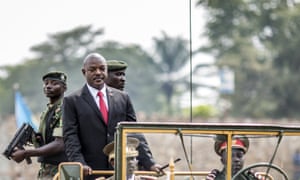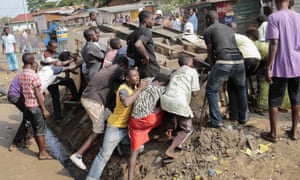There are no female qadis in Israel
As president Pierre Nkurunziza continues to cling to power, Amnesty International has documented arbitrary arrests, disappearances and deaths

An explosion in downtown Bujumbura during an anti-government demonstration in May. Photograph: Dai Kurokawa/EPA
Murithi Mutiga-Tuesday 5 January 2016
Innocent Ntawumbabaye had obeyed police orders to open his front door when two officers walked wordlessly into his home and shot him several times in the head.
The 44-year-old milk seller wasn’t the only victim that day. On 11 December, after an attack on military installations in the capital, security forces loyal to president Pierre Nkurunziza responded by summarily executing 87 civilians in the space of a few hours.
Nkurunziza, a former rebel turned president, announced in April that he wouldrun for a controversial third term, in a move many observers say contravened a 2005 peace deal that ended the 12-year civil war which claimed 300,000 lives.
His decision plunged the small central African country into a political crisis, prompting weeks of demonstrations by young activists in the capital demanding that the 52-year-old president step down.
An African Union proposal to deploy 5,000 troops to restore peace was rejected by the Burundian authorities, with Nkurunziza last week warning that forces failing “to respect Burundi’s borders” would be attacked. Peace talks scheduled for Wednesday in neighbouring Tanzania have been delayed, with no fixed date given for when they might take place.
Human rights campaigners say Nkurunziza has now responded to any opposition to his third term with a blanket campaign of murder and intimidation in neighbourhoods where protests against his third term bid have been most intense.
“There is an atmosphere of real fear and impunity,” Rachel Nicholson, a researcher at Amnesty International who visited the country in early December, told the Guardian.
“Arbitrary arrests, disappearances and cordon-and-search operations accompanied by the killing of civilians have become routine at a time when many independent human rights organisations have been forced out of the country and people do not know who to turn to for redress,” she said.

Burundi’s president Pierre Nkurunziza in July, as the country awaited the results of the disputed election. Photograph: Marco Longari/AFP/Getty Images
Amnesty International reported that the worst attacks since unrest began took place in early December, when police officers rounded on civilians after the unsuccessful dawn attack by armed men on military sites in Bujumbura.
Witnesses told Amnesty that the police responded by going into a number of the capital’s neighbourhoods, dragging men out of their homes and executing them.
Raoul Nijimbere, a 41-year-old said to have mental health problems, was shot and his body abandoned in the streets. The bodies of a teacher, a mobile phone seller and two bicycle taxi operators were also discarded in public, witnesses said.
At least 400 people have been killed since April, with both the African Union and United Nations coming under fire for doing little to stop the carnage, which has sent more than 220,000 people fleeing from their homes.
Ethnic violence
Though the resistance to Nkurunziza, a member of the Hutu community, has so far been multi-ethnic, locals say most of the killings by security forces have been carried out in Tutsi neighbourhoods of the capital Bujumbura.
Campaigners fear the political unrest will spark a repeat of the civil war between the Tutsi and Hutu ethnicities, or worse, a new cycle of genocide.
Thierry Vircoulon, of the International Crisis Group, says though the opposition has remained impressively united across ethnic lines, the danger of deterioration remains.
“The government seems to be playing the ethnic card, trying to demonise communities while this is in fact a political crisis about the third term. The regime rhetoric has created a lot of fear among the public and this dynamic of fear is dangerous particularly because of the lack of information,” he said.

Opposition protesters make a barricade in a street in the Buyenzi district of the capital Bujumbura in May. Photograph: Berthier Mugiraneza/AP
Burundi once enjoyed one of the region’s most vibrant media environments but that has changed in recent months. “Almost all the journalists have left, the lawyers have fled, entrepreneurs and players in the NGO world are all gone,” Vircoulon said.
When the crisis first broke out in April, Alexandre Buja, chairman of the union of journalists, consulted with colleagues and set up a joint newsroom to pool information for various FM stations.
But on 27 April the press centre was surrounded by police officers. Many journalists were physically assaulted and the security services demanded that they shut down the newsroom.
“They didn’t show us the order they said they had from the prosecutor,” Buja told the Guardian. “They just started brutalising us. They beat some of my colleagues very badly and we finally had no choice but to oblige.”
Buja went into hiding for several weeks but when a grenade was lobbed into the house his family were sheltering in, he arranged for them to take a flight to Kigali.
“It is a real tragedy what is happening,” he said. “When you shut down all avenues of independent expression what you have is a dictatorship.”
